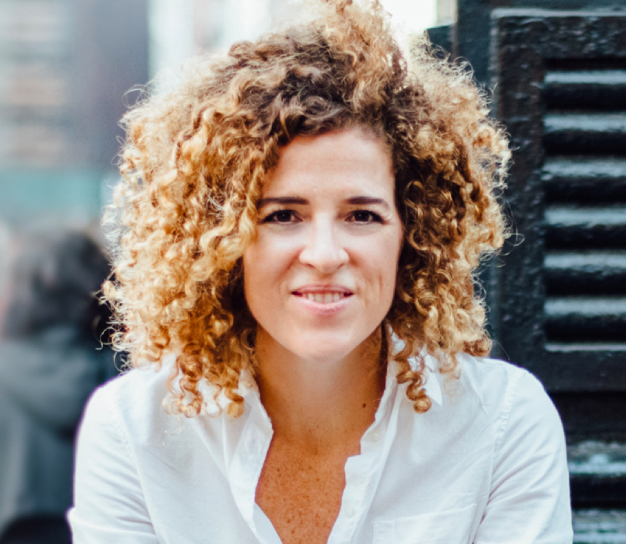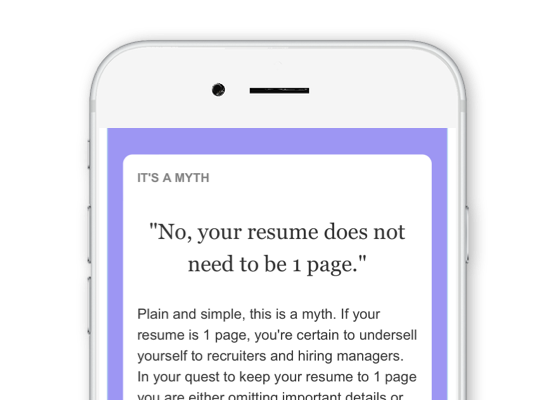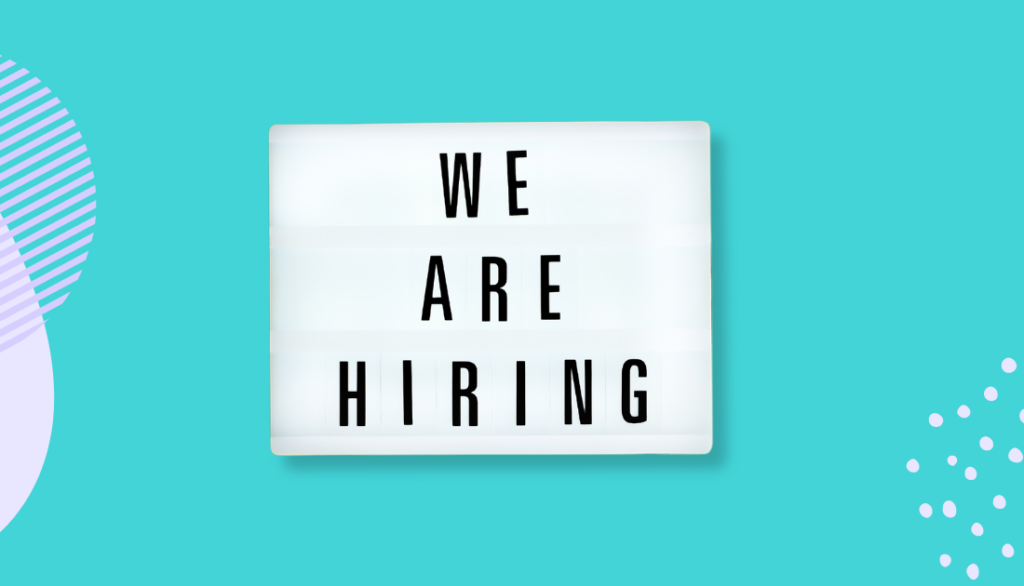12 min read
Ageism in User Experience and Tech Jobs: How to Re-Frame and Deal With It
11 min read
11 min read

In this episode of the Career Strategy Podcast, we dive into the topic of ageism in user experience and tech jobs. Ageism exists at both ends of the career spectrum and in this episode we’ll focus on challenges that people who are further along in their careers might face. Though ageism exists, your experience can be an asset it starts with re-framing how you see your age because it’s not as big of a disadvantage as you may think.
Read the transcript or listen to the episode:
Am I too old to get hired in tech or user experience? Or any field for that matter? This is a question that I’m asked all the time. And it’s a pretty controversial topic. And I have some strong thoughts on it. So let’s get to it.
I think ageism in user experience and tech has really turned into a narrative that is very polarizing, and gets a lot of clicks. And because of that, I think that’s why we’re seeing a lot of talk and chatter about this topic online right now, yes, of course, some companies or people are 100%, guilty of bias and unfair hiring practices based on age. Today, I want to go beyond the surface and share what I’ve seen with people, whether 50 or 60 years old, or 20 years old, who I’ve helped over the last few years. So today, let’s have a little bit of a deeper conversation about this topic of ageism in UX and tech.
Almost every day on LinkedIn, and Twitter and Instagram, etc I see posts about ageism in technology or outside the technology industry, and people saying they didn’t get hired because they were too old or too young, etc. When you don’t get the job offer or the interview, it is easy to want something or someone to blame. And as I said earlier, I think there is a narrative right now, that is making ageism, maybe a bigger deal than it actually is. So stick with me and I will explain myself, in case you don’t agree.
Your Age and Experience is an Asset
How old you are is not within your control. You can’t change that, right? What you can change is how you talk about experience, how you market yourself, how you sell yourself, and change the story that you’re telling yourself about the impact of your age in your career. And sidenote, great companies, the ones you want to actually work at, won’t care how old you are. And honestly, if you don’t get hired, or don’t get an interview, because of your age, or perceived lack of experience, or perceive too much experience, it might be a blessing in disguise, because this could really be a yellow flag about the company’s culture and values, which most likely wouldn’t line up with yours. So today, I want to focus on ageism, as it relates to people who are older and further in their career. And maybe in another episode, we will address ageism at the other end at the younger end.
I think this topic of ageism in tech is really trendy, you know, hot take type topic right now, that’s perpetuating the narrative of the tech and UX industries. And if you are a little older and worried about how your age might be perceived by a potential employer, etc, I want you to know that with more experience comes more skills and more knowledge that relate to your specific role, but also to specific industries or products and possibly more importantly, with more experience comes more soft skills that take time and honestly sometimes years to develop. So sure, you can learn a new software, the basics by taking a course and using the software for a few months, but skills such as written and verbal communication, negotiation, dealing with difficult people, critical thinking, decision making, time management, etc. All of these things can take years to learn and put into practice. And let’s face it, there is always room for improvement on many of these skills. And let’s not forget about other things such as emotional maturity, resilience, work ethic and other factors that might make someone a good team member, employee manager, etc. These are skills that someone who might be just starting out in their career might not have as developed as much as someone like us. You should have confidence in that.
Beyond Skills, Your Domain Knowledge Is An Asset
Another thing to remember is that as someone who’s been working in the professional world for a while, you have a lot of very valuable subject matter or domain knowledge, think of the various industries that you might have experience in outside of your specific job function. So maybe you’ve been a software developer or product designer for 20 years, chances are, you have experienced in a few industries, right? Maybe you have experience with healthcare industry, or education, or aerospace or finance or investing or I don’t know, supply chain management, who knows this domain knowledge, though, is gold. And if you’re looking for a new job right now, consider if you’re leveraging this experience, and what I mean is, for example, if you have 15 years of experience in aerospace, and you are applying to jobs in e-commerce, where you have no experience, just because you really want to work in Amazon, perhaps you need to adjust course, because by applying to jobs in aerospace, where you have 15 years of experience, you could be really seen as what I call a top shelf candidate, because your 15 years of experience will help you stand out from another applicant that has zero years of experience in aerospace. So it came down to you and that other person, guess who is going to stand out you because you would not need to take time to learn about the aerospace industry, you’d be ready to go on day one, which is a massive plus, for any company.
I thought it would be just interesting to highlight two people from my career coaching program Career Strategy Lab, who were older and did get hired, one of them was in their 50s. And the old one was in their 60s. And they were both able to secure new jobs that truly aligned with their career goals, and what they were looking for. And I’m going to change their name for privacy purposes.
Meet Ashley, In Her 60’s
So first, we have Ashley and Ashley was in her 60s when she joined Career Strategy Lab. She had worked in service design and healthcare for over 20 years and wanted to continue doing that even though she wasn’t urgently looking for a new job. She wanted to explore what her options could be in terms of roles, responsibilities and salary.
One of the challenges she faced was that because she had over 20 years of experience, she really had to be strategic about which projects and roles from her past and skills to focus on in her resume on her LinkedIn profile. And in in her portfolio. In her case, she had a portfolio, Ashley specifically did not want to have direct reports she did not want to get in to management. She created her portfolio, her resume her LinkedIn. And she applied for jobs that really aligned with this. And ultimately, Ashley ended up getting hired at a service design principal at a major health care company. Ashley said that age never once came up as an issue or perceived issue in her job search. And she said that really leaning into her existing experience in healthcare and service design, to demonstrate the strength of her skills and experience is what helped elevate her from other candidates. That’s just one person. Again, Ashley was in her 60s.
Meet David, In His 50’s
Next up we have David who was in his 50s when he joined Career Strategy Lab and David had worked in UX for 20 years after a career break to take care of some family. And he wanted to get hired into the aerospace industry, which was his dream industry. And although he didn’t have aerospace experience necessarily, he did over 20 years of experience in many parts of UX as a founder and assistant professor and also of course, as a full time employee at many different companies. And David was able to communicate his well rounded experience beyond just his UX skills and research skills and such and demonstrated that he would be a high performing team member based on his track record, this arsenal of soft skills and people skills and communication skills and business knowledge that would allow him to comfortably get dropped into any industry honestly, and be able to not be intimidated by learning new business or something. And ultimately, he got hired at Blue Origin, the rocket company, and similar to Ashley he didn’t report any sense of encounter or perception of ageism in his UX job search or interviews or anything.
Benefits of Older Candidates for Companies
It’s really important to remember that it costs companies a lot of money need to hire employees. And the average cost in the United States is about $4,500 to hire a new employee, according to data from the society, for human resource management, also known as SHRM. And that $4,700 also doesn’t include things like the time that teams and managers might spend interviewing candidates, training candidates, et cetera. This is why people with more experience in their careers should not see it as a negative companies want people who have the hard and soft skills to function and perform in a role once they’re hired, because they don’t want that person to not work out, and then have to do another job search and spend a minimum of $4,700 trying to fill that role.
Again, of course, this is not meant to say that people with less experience can’t perform better or can’t learn those soft skills. That’s not what I’m saying. So to keep this episode from getting too long, I wanted to focus on ageism, as it relates to people who are later in their careers. And hopefully, give you some examples that give you more confidence that even if you do have 20 or 30 years of experience, companies still want people like you.
So here are three things that I want you to think about concerning ageism in user experience and tech:
- Is this topic of ageism in user experience as big of a deal as we think it is? Or is this a topic that sounds kind of hot and trendy, and is catching on social media and just something people are talking about right now, because it’s polarizing and getting clicks.
- I want you to trust that it’s actually a blessing that if a company does discriminate based on age, it could actually be a blessing because it’s a foreshadowing of their culture, probably a culture you don’t want to be a part of.
- If you are later in your career, I want you to have confidence in your skills and all of the years of domain and subject knowledge that you have. This could be what tips the scales in your favor. And this might be how you have to adjust your job search to think about the areas, industries etc. You have a lot of experience in that could help you have an edge over someone with zero years of experience in that industry.
All right. I hope this take on ageism in user experience and tech helps you think differently, reframe your perspective, and maybe give you more confidence that it may not be as big a deal as you think it is, and that it’s not totally out of your control. If you take the time to really look at your experience and hone in on aligning with the job that you want to get and tailor your resume, tailor your LinkedIn, tailor your portfolio etc. tailor the jobs you apply to this experience that you have that can help you stand out from other candidates.
Thanks for listening to the Career Strategy Podcast. Make sure to follow me Sarah Doody, on Twitter, Instagram, YouTube, or LinkedIn. If anything in today’s episode resonated with you, I’d love to hear about it. tag me on social media or send me a DM. And lastly, if you found this episode helpful, I’d really appreciate it. If you could share it with a friend or give us a quick rating on Spotify or review us on Apple podcasts. Catch you later.
Sarah Doody [00:00:00]: Hey there. I'm Sarah Doody, host of the Career Strategy Podcast. Many professionals are seeking more impact, flexibility, growth, and, let's face it, getting paid what they're worth. But how do you unlock this in your career? It starts with strategy. I'm taking you behind the scenes of what's working for my career coaching clients. You'll hear strategies and actionable, yet sometimes against the grain advice for how you can be the CEO of your career and stop dreading Mondays. Ready to level up your career? Let's get after it. Am I too old to get hired in tech or user experience? Or really any field for that matter? This is a question that I'm asked all the time and it's a pretty controversial topic and I have some strong thoughts on it.
Sarah Doody [00:00:52]: So let's get to it. I think ageism has really turned into a narrative that is very polarizing and gets a lot of clicks. And because of that, I think that's why we're seeing a lot of talk and chatter about this topic online right now. Yes, of course, some companies are. People are 100% guilty of bias and unfair hiring practices based on age. Today, I want to go beyond the surface and share what I've seen with people whether 50 or 60 years old or 20 years old, who I've helped over the last few years. So today we're going to have a little bit of a deeper conversation about this topic of ageism. Almost every day on LinkedIn and Twitter and Instagram, et cetera, I see posts about ageism in technology or outside the technology industry and people saying they didn't get hired because they were too old or too young, etc.
Sarah Doody [00:01:58]: When you don't get the job offer or the interview, it is easy to want something or someone to blame. And as I said earlier, I think there is a narrative right now that is making ageism maybe a bigger deal than it actually is. So stick with me and I will explain myself in case you don't agree. All right, so how old you are is not within your control. You can't change that, right? What you can change is how you talk about experience, how you market yourself, how you sell yourself, and change the story that you're telling yourself about the impact of your age in your career. And side note, great companies, the ones you want to actually work at, won't care how old you are. And honestly, if you don't get hired or don't get an interview because of your age or perceived lack of experience or perceived too much experience, it might be a blessing in disguise because this could really be a yellow flag about the company's culture and values, which most likely wouldn't line up with yours anyway. So today I want to focus on ageism as it relates to people who are older and further in their career.
Sarah Doody [00:03:18]: And maybe in another episode, we will address ageism at the other end. At the younger end. So, as I said earlier, I think this topic of ageism is really trendy, hot take type topic right now that's perpetuating the narrative of the tech and UX industries. And if you are a little older and worried about how your age might be perceived by a potential employer, et cetera, I want you to know that with more experience comes more skills and more knowledge that relate to your specific role, but also to specific industries or products. And possibly more importantly, with more experience comes more soft skills that take time and honestly, sometimes years to develop. So sure, you can learn a new software the basics by taking a course and using the software for a few months. But skills such as written and verbal communication, negotiation, dealing with difficult people, critical thinking, decision making, time management, et cetera, all of these things can take years to learn and put into practice. And let's face it, there is always room for improvement on many of these skills.
Sarah Doody [00:04:33]: And let's not forget about other things such as emotional maturity, resilience, work ethic, and other factors that might make someone a good team member, employee, manager, et cetera. These are skills that someone who might be just starting out in their career might not have developed as much as someone like you. So you should have confidence in that. And another thing to remember is that as someone who's been working in the professional world for a while, you have a lot of very valuable subject matter or domain knowledge. Think of the various industries that you might have experience in outside of your specific job function. So maybe you've been a software developer or product designer for 20 years. Chances are you have experience in a few industries, right? Maybe you have experience with healthcare industry or education, or aerospace, or finance, or investing, or, I don't know, supply chain management. Who knows? This domain knowledge, though, is gold.
Sarah Doody [00:05:39]: And if you're looking for a new job right now, consider if you're leveraging this experience. And what I mean is, for example, if you have 15 years of experience in aerospace and you are applying to jobs in Ecommerce, where you have no experience, just because you really want to work at Amazon, perhaps you need to adjust course. Because by applying to jobs in aerospace, where you have 15 years of experience, you could be really seen as what I call a top shelf candidate, because your 15 years of experience will help you stand out from another applicant that has zero years of experience in aerospace. If it came down to you and that other person, guess who is going to stand out? You. Because you would not need to take time to learn about the aerospace industry. You'd be ready to go on day one, which is a massive plus for any company. I thought it would be just interesting to highlight two people from my career coaching program, career Strategy Lab, who were older and did get hired. One of them was in their fifty s and the other one was in their sixty s.
Sarah Doody [00:06:50]: And they were both able to secure new jobs that truly aligned with their career goals and what they were looking for. And I'm going to change their name for privacy purposes, but let's get right to it here. So first we have Ashley. And Ashley was in her 60s when she joined Career Strategy Lab. She had worked in service design and healthcare for over 20 years and wanted to continue doing that even though she wasn't urgently looking for a new job. She wanted to explore what her options could be in terms of roles, responsibilities and salary. One of the challenges she faced was that because she had over 20 years of experience, she really had to be strategic about which projects and roles from her past and skills to focus on, in her resume, on her LinkedIn profile, and in her portfolio. In her case, she had a portfolio.
Sarah Doody [00:07:48]: Ashley specifically did not want to have direct reports. She did not want to get into management. She created her portfolio, her resume, her LinkedIn, and she applied for jobs that really aligned with this. And ultimately Ashley ended up getting hired as a service design principal at a major healthcare company. Ashley said that age never once came up as an issue or perceived issue in her job search. And she said that really leaning into her existing experience in healthcare and service design to demonstrate the strength of her skills and experience is what helped elevate her from other candidates. That's just one person. Again, Ashley was in her 60s.
Sarah Doody [00:08:36]: Next up we have David, who was in his 50s when he joined Career Strategy Lab. And David had worked in UX for 20 years after a career break to take care of some family. And he wanted to get hired into the aerospace industry, which was his dream industry. And although he didn't have aerospace experience necessarily, he did owe over 20 years of experience in many parts of UX as a founder and assistant professor and also of course as a full time employee at many different companies. And David was able to communicate his wellrounded experience beyond just his UX skills and research skills and such, and demonstrated that he would be a high performing team member based on his track record. This arsenal of soft skills and people skills and communication skills and business knowledge that would allow him to comfortably get dropped into any industry honestly and be able to not be intimidated by learning new business or something. And ultimately he got hired at Blue Origin, the Rocket company. And similar to Ashley, he didn't report any sense of encounter or perception of ageism in his job search or interviews or anything.
Sarah Doody [00:09:54]: It's really important to remember that it costs companies a lot of money to hire employees. And the average cost in the United states is about $4,500 to hire a new employee, according to data from the Society for Human Resource Management, also known as SHRM. And that $4,700 also doesn't include things like the time that teams and managers might spend interviewing candidates, training candidates, et cetera. This is why people with more experience in their careers should not see it as a negative. Companies want people who have the hard and soft skills to function and perform in a role once they're hired because they don't want that person to not work out and then have to do another job search and spend a minimum of $4,700 trying to fill that role. Again, of course, this is not meant to say that people with less experience can't perform better or can't learn those soft skills. That's not what I'm saying. So to keep this episode from getting too long, I wanted to focus on ageism as it relates to people who are later in their careers and hopefully give you some examples that give you more confidence that even if you do have 2030 years of experience, companies still want people like you.
Sarah Doody [00:11:23]: So the three things that I want you to think about concerning ageism in getting hired and in the tech and UX or frankly, any industry is really number one. Is this topic of ageism as big of a deal as we think it is? Or is this a topic that sounds kind of hot and trendy and is catchy on social media and just something people are talking about right now because it's polarizing and getting clicks .2? I want you to trust that it's actually a blessing that if a company does discriminate based on age, it could actually be a blessing because it's a foreshadowing of their culture, probably a culture you don't want to be a part of. And the third point is that if you are later in your career, I want you to have confidence in your skills and all of the years of domain and subject knowledge that you have. This could be what tips the scales in your favor, and this might be how you have to adjust your job search to think about the areas, industries, et cetera, that you have a lot of experience in that could help you have an edge over someone with zero years of experience in that industry. All right, I hope this take on ageism helped you think differently, reframe your perspective, and maybe give you more confidence that it may not be as big a deal as you think it is and that it's not totally out of your control. If you take the time to really look at your experience and hone in on aligning with the job that you want to get, and tailor your resume, tailor your LinkedIn, tailor your portfolio, et cetera, tailor the jobs you apply to this experience that you have that can help you stand out from other candidates. Thanks for listening to the Career strategy podcast. Make sure to follow me.
Sarah Doody [00:13:17]: Sarah Doody on Twitter and Instagram. YouTube or LinkedIn? If anything in today's episode resonated with you, I'd love to hear about it. Tag me on social media or send me a DM. And lastly, if you found this episode helpful, I'd really appreciate it if you could share it with a friend or give us a quick rating on Spotify or review on Apple podcasts. Catch you later.









